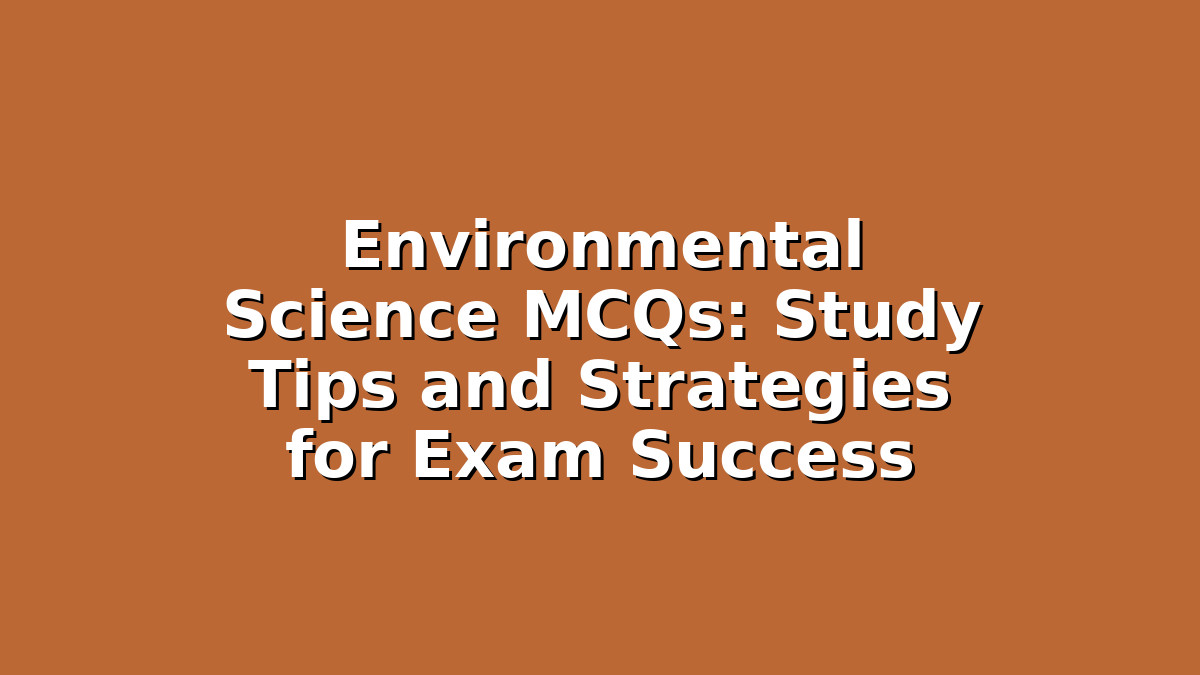Preparing for exams can be a challenging experience, especially when it comes to subjects like Environmental Science, which combines complex concepts from biology, chemistry, geography, and social studies. Multiple Choice Questions (MCQs) are a common exam format used to test your knowledge efficiently. If you’re a student looking to excel in Environmental Science exams, understanding how to approach MCQs effectively can make a significant difference. In this article, we will explore useful study tips and strategies to master Environmental Science MCQs and boost your confidence for exam day.
Understanding Environmental Science MCQs: What to Expect
Environmental Science covers a broad range of topics including ecosystems, biodiversity, pollution, climate change, resource management, and sustainable development. MCQs in this subject are designed not only to test your memorization but also your analytical and problem-solving skills.
MCQs often include four or five options, with only one correct answer. Some questions may test straightforward facts, while others require you to interpret data, analyze scenarios, or apply concepts to real-world situations. Because of this variety, your preparation needs to be comprehensive and strategic.
Before diving into study techniques, it’s important to familiarize yourself with the common themes in Environmental Science MCQs:
– Basic environmental concepts: definitions, principles, and key terms.
– Ecosystems and biodiversity: food chains, habitats, species interactions.
– Pollution and waste management: types of pollution, effects, control methods.
– Natural resources: water, soil, minerals, renewable vs. non-renewable.
– Climate change and global warming: causes, impacts, mitigation strategies.
– Sustainable development: policies, practices, and international agreements.
Section 1: Creating an Effective Study Plan for Environmental Science MCQs
One of the most important steps in excelling at MCQs is having a well-structured study plan. Here’s how you can organize your preparation effectively:
1. Breakdown the syllabus: Start by dividing the syllabus into manageable topics. This helps avoid feeling overwhelmed. Focus on one topic at a time and ensure you understand its core concepts before moving on.
2. Set realistic study goals: Establish daily or weekly goals for the number of topics or MCQs you want to cover. Consistency is key—regular study sessions, even if shorter, are more effective than last-minute cramming.
3. Use a variety of study materials: Don’t rely on just textbooks. Supplement your learning with online quizzes, videos, flashcards, and revision notes. Interactive resources can make studying more engaging and help reinforce your understanding.
4. Incorporate active recall and spaced repetition: Test yourself frequently instead of passively rereading notes. Use apps or physical flashcards to review important terms and concepts at spaced intervals; this improves memory retention.
5. Practice with past papers and sample MCQs: Familiarizing yourself with the exam format and question styles reduces anxiety. Timed practice sessions simulate exam conditions and improve your speed and accuracy.
Section 2: Tips for Tackling Environmental Science MCQs on Exam Day
The day of the exam can be stressful, but having a clear approach to MCQs can help you stay calm and focused. Here are some valuable tips:
1. Read questions carefully: MCQs often contain keywords or qualifiers like “not,” “except,” or “most likely.” Missing these can lead to incorrect answers. Take your time to understand exactly what the question asks.
2. Eliminate obviously wrong answers: Narrow down your choices by crossing out options that you know are incorrect. This increases your chances of selecting the right answer, even if you have to make an educated guess.
3. Watch out for tricky options: Sometimes, options are designed to confuse by being very similar. Look for subtle differences and consider the context of the question.
4. Don’t overthink or second-guess yourself: Trust your preparation and first instincts. Changing answers repeatedly can sometimes lead to mistakes.
5. Manage your time wisely: Keep an eye on the clock. If a question is taking too long, move on and return to it later if time permits.
Section 3: Building Deeper Understanding Beyond MCQs for Long-Term Success
While MCQs test specific knowledge, deep understanding of environmental science topics will help you excel not only in exams but also in practical applications like projects and discussions. Here are some strategies to deepen your grasp of the subject:
1. Connect concepts to real-world examples: Try to relate what you’re learning to current environmental issues such as deforestation, plastic pollution, or climate change policies. This makes the information more relevant and easier to remember.
2. Engage in group study sessions: Explaining topics to peers and hearing their perspectives can clarify doubts and reinforce learning. Group discussions often reveal new insights that you might not have discovered on your own.
3. Follow environmental news and documentaries: Staying updated with environmental developments helps contextualize textbook knowledge and can provide fresh material for essay questions or case studies.
4. Practice drawing diagrams and charts: Many environmental science concepts—like food webs or pollution cycles—are easier to understand visually. Creating your own diagrams aids memory and comprehension.
5. Seek help from teachers or online forums: If a concept feels tricky, don’t hesitate to ask for clarification. Online communities and educational websites often offer explanations and additional resources.
Conclusion
Studying for Environmental Science MCQs may seem daunting at first due to the wide range of topics and the need for both factual knowledge and analytical skills. However, with a consistent study plan, smart exam strategies, and a commitment to deepening your understanding, you can confidently tackle any MCQ exam. Remember, preparation is not just about memorizing facts but about cultivating curiosity and connecting ideas. Keep practicing, stay motivated, and you’ll be well-equipped to succeed in your Environmental Science exams and beyond.
Good luck with your studies, and remember that every small step you take now is a big leap toward your academic goals!

Responses